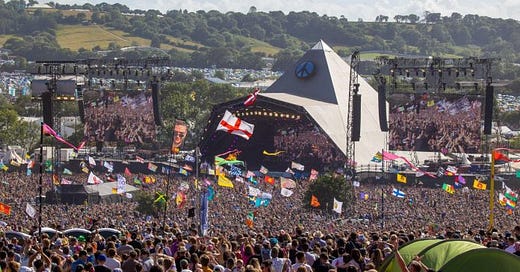I haven’t had much time for writing on Substack lately - it’s the academic conference season, and I’m trying to catch up on various research projects that have taken a back seat to teaching commitments. But I saw a couple of tweets about young people having fun this summer, and I wanted to write something about that.
Back in the early days of COVID, there was an prevailing theory among the Lockdown Sceptic side that things would never go back to normal. According to them, the lockdowns and vaccine passports represented the beginning of a sinister World Economic Forum takeover, the pandemic had been planned long in advance, and public health restrictions would be in place forever as a means of restricting freedom.
Well, that’s not exactly what happened. Last week was the second anniversary of the 19th July 2021 “Freedom Day” in the UK, and barring a relatively short-term return to masking and enhanced border controls during the first phase of the December 2021 BA.1 omicron outbreak, almost the entire national coronavirus apparatus has now been dismantled. While a few posters haven’t been removed, for the most part things are back to normal now. Someone waking from a November 2019 coma might be hard pushed to spot that anything has been different in the meantime. Except … on Twitter.
While music festivals and packed out sports events are taking place in Europe and elsewhere, in certain parts of social media we are still hearing the language of super-spreader events, R>1, immune-escape variants and so on.
I personally find this quite troubling. On some level, if not now, then when? Young people put large aspects of their lives on hold to slow down the spread of a virus with an exponentially decaying fatality rate moving down by age. If they can’t now enjoy the festivals and parties that they missed, despite the COVID death rate being as low as it has ever been, then when can they?
I honestly think that you couldn’t give the Lockdown Sceptics a bigger boost than by continuing to cancel or restrict these kinds of events. Of course, from a purely public health point of view, it might be better if they didn’t happen, but very few of us lead our lives sticking entirely to public health guidance. What makes us human, and what makes life worth living, is the pint with friends, the double cheeseburger at the end of a long day’s work, the birthday cake shared in the office. All of these things might raise an eyebrow from some corners of public health, but we generally go ahead and do them anyway.
And further, you don’t have to look too far to see language of punishment and shame around these summer festival events. For example, while Taylor Swift continues her triumphant Eras tour of the largest stadiums on earth, some people aren’t happy:
I don’t think I’m alone in thinking that it’s not healthy to talk about illness as a punishment for perceived bad deeds. It’s a short step from that to deciding that some people are more deserving of hospital treatment than others, that sports injuries or drug addiction represent some kind of personal or moral failing, and even perhaps that other disabled people are experiencing karma.
Now, everything I’ve written might be taken as implying that COVID is over, and there won’t be any more waves. I certainly don’t think that’s true - though I think the potential for waves big enough to threaten hospital capacity or to cause widespread loss of life is limited in the vaccine era. In fact, I’ve been pleasantly surprised that we didn’t see a return to growth in June as I had slightly pessimistically predicted, though it seems like it might be happening now.
However, I think the language of “super-spreader events” in the original tweet betrays a fair amount of pre-vaccine thinking. Of course, back in times of exponential growth in a population without widespread immunity, there was limited reason to think that the curve would flatten by itself before hospital beds had been overwhelmed, and there was a clear argument to slow down growth.
But now, things are different. Ever since the first BA.1 wave, we’ve seen a succession of waves sweep in, peak, and sweep out again. For the most part the tide has gone in and out without any significant intervention (though some well-timed booster campaigns have probably helped slow the growth of some waves). And in general, I would expect this to be the pattern in future - that omicron-descendant waves will be largely self-limiting.
If that’s the case, then however much spreading takes place there, the effect of a one-off event will be limited. Essentially, even if (in an extremely implausible scenario) national infection levels doubled overnight as a result, then it would mainly just bring the peak earlier, but would be unlikely to have a significant effect on the overall total number of infections. It’s like the way a single blow-out meal is unlikely to cause you to gain significant amounts of weight on its own.
Overall then, I’m pretty relaxed about the festivals and concerts happening at the moment. We may have returned into growth (though this may not survive long past the end of school terms), but it doesn’t feel to me at all proportional to restrict young people from having a well-deserved good time on that basis. And given the fact that at some point in the future a bird flu or other pandemic may require a return to some kind of restrictions, I think it’s important not to give the Lockdown Sceptics ammunition by providing them with the permanent healthcare restrictions that they long to be fighting against.





